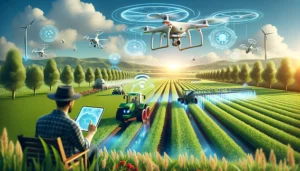Future of Agriculture Education: Cultivating Innovation
As our global population continues to grow, the importance of agriculture and the need for sustainable practices become increasingly critical. In this context, the future of agriculture education plays a pivotal role in equipping the next generation with the knowledge and skills required to address these challenges. “Future of Agriculture Education: Cultivating Innovation” is a comprehensive exploration of how agricultural studies are evolving to meet modern needs and embrace technological advancements.
Understanding the Future of Agriculture Education
Agriculture education is no longer confined to traditional farming techniques and rural practices. Today, it encompasses a wide range of disciplines, including technology, sustainability, and innovative farming methods. The future of agriculture education lies in integrating these diverse fields to create a holistic learning experience. Students are being taught to think critically, solve complex problems, and adapt to changing environments. This multifaceted approach ensures that graduates are well-prepared to lead the agricultural sector into the future. The “Future of Agriculture Education: Cultivating Innovation” emphasizes the need for a dynamic and forward-thinking curriculum that addresses contemporary issues.
The Need for Innovation in Agricultural Studies
Innovation in agricultural studies is essential for several reasons. Firstly, it addresses the pressing need for sustainable farming practices that minimize environmental impact and conserve resources. Secondly, it equips students with the tools and knowledge to leverage modern technology in agriculture. This includes everything from precision farming techniques to the use of big data in crop management. Lastly, innovation fosters a culture of continuous improvement and adaptability, which is crucial in an industry that is constantly evolving. The “Future of Agriculture Education: Cultivating Innovation” underscores the necessity of embracing new ideas and technologies to ensure the sustainability and productivity of agriculture.
Technological Advancements
- Integrating AI and Robotics in Agriculture Education
Artificial Intelligence (AI) and robotics are revolutionizing agriculture, and their integration into education is vital for preparing students for the future. AI can be used for various applications, such as predicting crop yields, optimizing irrigation, and detecting plant diseases. Robotics, on the other hand, can automate labor-intensive tasks, increasing efficiency and reducing costs. By incorporating AI and robotics into agriculture education, students gain hands-on experience with cutting-edge technologies and learn to apply them in real-world scenarios. The “Future of Agriculture Education: Cultivating Innovation” highlights the importance of equipping students with these skills to enhance productivity and innovation in the agricultural sector.
- The Role of Drones and Sensors in Modern Farming
Drones and sensors are becoming increasingly prevalent in modern farming due to their ability to provide valuable data and insights. Drones can be used for aerial imaging, monitoring crop health, and assessing soil conditions, while sensors can track environmental factors such as temperature, humidity, and soil moisture. By integrating these technologies into agriculture education, students can learn how to utilize data to make informed decisions and improve farming practices. The “Future of Agriculture Education: Cultivating Innovation” emphasizes the significance of teaching students about these technologies to enhance their analytical and problem-solving abilities.
Sustainable Practices
- Teaching Sustainability in Agriculture
Sustainability is a core component of modern agriculture education. Teaching sustainability involves educating students about practices that promote environmental health, economic viability, and social equity. This includes topics such as sustainable land management, conservation of natural resources, and the use of renewable energy sources. By incorporating sustainability into the curriculum, students learn to approach agriculture with a holistic perspective that considers long-term impacts. The “Future of Agriculture Education: Cultivating Innovation” highlights the need to prioritize sustainability in agriculture education to ensure a resilient and sustainable future for the industry.
- The Importance of Organic Farming Education
Organic farming is an essential aspect of sustainable agriculture, focusing on practices that enhance soil health, biodiversity, and ecological balance. Educating students about organic farming involves teaching them techniques such as crop rotation, composting, and the use of natural pest control methods. By understanding the principles of organic farming, students can contribute to the growing demand for organic products and promote environmentally friendly farming practices. The “Future of Agriculture Education: Cultivating Innovation” underscores the importance of integrating organic farming education into the curriculum to support sustainable agriculture.
Curriculum Development
- Modernizing Agricultural Curriculums
Modernizing agricultural curriculums is crucial for keeping pace with technological advancements and industry trends. This involves updating course content to include emerging topics such as precision agriculture, digital farming, and biotechnology. Additionally, incorporating experiential learning opportunities, such as internships and hands-on projects, can enhance students’ practical skills and industry knowledge. The “Future of Agriculture Education: Cultivating Innovation” emphasizes the need for a dynamic and relevant curriculum that prepares students for the challenges and opportunities of modern agriculture.
- Incorporating Technology and Sustainability
Integrating technology and sustainability into agricultural curriculums is essential for preparing students to address contemporary challenges. This includes teaching students how to use technology to improve efficiency and productivity while maintaining sustainable practices. For example, courses on precision agriculture can teach students how to use data and technology to optimize resource use and minimize environmental impact. By incorporating these elements into the curriculum, agriculture education can produce graduates who are equipped to innovate and lead in the industry. The “Future of Agriculture Education: Cultivating Innovation” highlights the importance of this integrated approach in shaping the future of agriculture.
Online and Remote Learning
- The Rise of E-Learning in Agriculture Education
The rise of e-learning has transformed education across various disciplines, including agriculture. Online courses and digital resources provide flexible and accessible learning opportunities for students worldwide. E-learning platforms can offer courses on topics such as sustainable farming practices, agricultural technology, and agribusiness management. These platforms often include interactive elements such as videos, quizzes, and discussion forums, enhancing the learning experience. The “Future of Agriculture Education: Cultivating Innovation” explores how e-learning is making agriculture education more inclusive and adaptable to the needs of diverse learners.
- Virtual Labs and Simulations: A New Learning Approach
Virtual labs and simulations are innovative tools that provide students with hands-on learning experiences in a digital environment. These tools can simulate real-world scenarios, allowing students to practice skills such as crop management, soil analysis, and pest control without the need for physical resources. Virtual labs and simulations also enable students to experiment with different variables and observe the outcomes, enhancing their understanding of complex concepts. The “Future of Agriculture Education: Cultivating Innovation” emphasizes the potential of these technologies to revolutionize agriculture education by providing immersive and interactive learning experiences.
Industry Collaboration
- Partnerships Between Educational Institutions and Agribusinesses
Partnerships between educational institutions and agribusinesses are vital for the future of agriculture education. These collaborations provide students with practical experience, industry insights, and access to advanced technologies. Educational institutions benefit from these partnerships by staying updated with the latest industry trends and innovations. Agribusinesses, on the other hand, gain access to a pool of talented students who are well-prepared to enter the workforce. Programs that facilitate these partnerships include joint research projects, guest lectures from industry experts, and collaborative workshops. “Future of Agriculture Education: Cultivating Innovation” emphasizes the importance of these partnerships in preparing students for real-world challenges.
- Internship and Apprenticeship Opportunities
Internships and apprenticeships are critical components of agriculture education, offering students hands-on experience and a chance to apply their classroom knowledge in real-world settings. These opportunities allow students to work directly with professionals, learn industry-specific skills, and gain valuable insights into their chosen field. Many agribusinesses offer structured internship and apprenticeship programs that include mentorship, training, and potential job placements. “Future of Agriculture Education: Cultivating Innovation” highlights the role of these practical experiences in bridging the gap between education and employment, ensuring that students are job-ready upon graduation.
Case Studies
- Successful Models of Innovative Agriculture Education
Several educational institutions have implemented successful models of innovative agriculture education that can serve as examples for others. For instance, Wageningen University in the Netherlands is renowned for its cutting-edge research and emphasis on sustainable agriculture. The university offers interdisciplinary programs that integrate technology, environmental science, and economics. Another example is the University of California, Davis, which provides students with access to extensive research facilities and hands-on learning opportunities in fields such as viticulture and animal science. “Future of Agriculture Education: Cultivating Innovation” showcases these successful models to demonstrate how innovative approaches can enhance the learning experience and produce well-rounded graduates.
- Lessons from Leading Agricultural Schools
Leading agricultural schools around the world have adopted various strategies to stay at the forefront of education and research. These institutions prioritize interdisciplinary collaboration, invest in state-of-the-art facilities, and foster strong industry partnerships. For example, Cornell University’s College of Agriculture and Life Sciences emphasizes experiential learning and offers students numerous opportunities for fieldwork, internships, and research projects. Similarly, the Royal Agricultural University in the UK focuses on sustainable practices and integrates modern technologies into its curriculum. “Future of Agriculture Education: Cultivating Innovation” explores the lessons learned from these leading institutions and how they can be applied to other schools to improve agriculture education.
Challenges and Solutions
- Addressing Barriers to Innovation in Agriculture Education
Despite the progress made, there are still barriers to innovation in agriculture education. These barriers include limited funding, resistance to change, and a lack of access to modern technologies. Addressing these challenges requires a multifaceted approach. Increasing investment in education and research is crucial to provide the necessary resources for innovation. Additionally, fostering a culture of openness and adaptability within educational institutions can help overcome resistance to change. Collaboration with industry partners can also facilitate access to advanced technologies and practical knowledge. “Future of Agriculture Education: Cultivating Innovation” emphasizes the need to address these barriers to create a more dynamic and effective educational system.
- Strategies for Overcoming Educational Challenges
Several strategies can be employed to overcome the challenges faced in agriculture education. Firstly, integrating technology into the curriculum can enhance the learning experience and better prepare students for modern agricultural practices. Secondly, promoting interdisciplinary collaboration can encourage students to think holistically and develop innovative solutions to complex problems. Thirdly, establishing strong industry partnerships can provide students with practical experience and exposure to real-world challenges. Finally, prioritizing sustainability and environmental stewardship in education can help cultivate a new generation of responsible and forward-thinking agricultural professionals. “Future of Agriculture Education: Cultivating Innovation” highlights these strategies as essential for overcoming educational challenges and promoting continuous improvement.
Future Projections
- The Future Landscape of Agriculture Education
The future landscape of agriculture education is expected to be characterized by increased integration of technology, a focus on sustainability, and a greater emphasis on experiential learning. Advances in digital tools, such as artificial intelligence, robotics, and big data analytics, will play a significant role in shaping the curriculum and teaching methods. Sustainable practices, including organic farming and resource conservation, will become central themes in education. Additionally, the rise of e-learning and virtual simulations will provide students with flexible and immersive learning experiences. “Future of Agriculture Education: Cultivating Innovation” explores these trends and their implications for the future of agriculture education.
- Preparing Students for Future Agricultural Trends
Preparing students for future agricultural trends requires a proactive and forward-thinking approach. Educational institutions must continuously update their curriculum to reflect the latest industry developments and technological advancements. Providing students with opportunities for hands-on learning, internships, and industry engagement is essential for developing practical skills and industry knowledge. Encouraging interdisciplinary collaboration and critical thinking will also help students adapt to the evolving agricultural landscape. “Future of Agriculture Education: Cultivating Innovation” emphasizes the importance of preparing students for future trends to ensure their success in a rapidly changing industry.
Summarizing Key Points
In summary, the future of agriculture education lies in embracing innovation, technology, and sustainability. Partnerships between educational institutions and agribusinesses, along with internship and apprenticeship opportunities, play a crucial role in preparing students for the workforce. Successful models of innovative agriculture education and lessons from leading agricultural schools provide valuable insights for improving educational practices. Addressing barriers to innovation and employing effective strategies can enhance the learning experience and promote continuous improvement. The future landscape of agriculture education will be shaped by technological advancements, sustainable practices, and experiential learning. “Future of Agriculture Education: Cultivating Innovation” underscores the importance of these developments in shaping a resilient and sustainable agricultural sector.
The Road Ahead for Agriculture Education
The road ahead for agriculture education is filled with opportunities and challenges. By embracing innovation and adapting to industry trends, educational institutions can equip students with the skills and knowledge needed to lead the agricultural sector into the future. Investing in modern technologies, fostering industry partnerships, and prioritizing sustainability will be essential for creating a dynamic and effective educational system. As we look to the future, it is clear that the “Future of Agriculture Education: Cultivating Innovation” will play a pivotal role in ensuring a sustainable and prosperous future for agriculture. By cultivating a new generation of skilled and forward-thinking professionals, we can address the challenges of tomorrow and build a more sustainable world.
FAQs
1. What is the “Future of Agriculture Education: Cultivating Innovation”?
Ans. The “Future of Agriculture Education: Cultivating Innovation” explores how agricultural studies are evolving to meet modern needs through technology, sustainability, and innovative practices.
2. Why is innovation important in agricultural education?
Ans. Innovation is crucial for addressing challenges like climate change, food security, and resource conservation, ensuring a sustainable and productive agricultural sector.
3. How are AI and robotics integrated into agriculture education?
Ans. AI and robotics are taught to students for applications like crop prediction, automated farming, and efficient resource management, preparing them for future industry demands.
4. What role do drones and sensors play in modern farming education?
Ans. Drones and sensors are used in education to monitor crop health, soil conditions, and environmental factors, providing students with hands-on experience in data-driven farming.
5. How does the “Future of Agriculture Education: Cultivating Innovation” impact sustainability?
Ans. The initiative emphasizes sustainable practices, teaching students to use eco-friendly methods and technologies to ensure long-term agricultural productivity and environmental health.














Post Comment